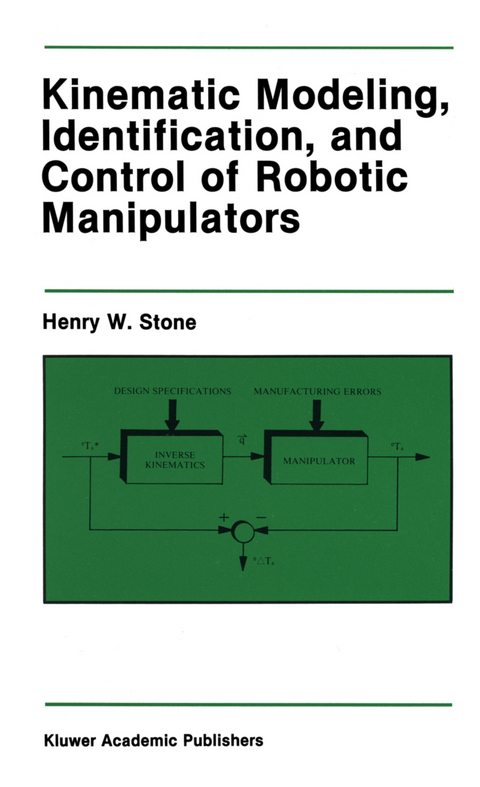
Kinematic Modeling, Identification, and Control of Robotic Manipulators
Kluwer Academic Publishers (Verlag)
978-0-89838-237-2 (ISBN)
1. Introduction.- 1.1. Overview.- 1.2. Motivation.- 1.3. Dissertation Goals and Contributions.- 1.4. Dissertation Outline.- 2. Review of Robot Kinematics, Identification, and Control.- 2.1. Overview.- 2.2. Coordinate Frame Kinematic Models.- 2.3. Models of Revolute Joint Manipulators.- 2.4. Modeling Assumptions.- 2.5. Kinematic Identification.- 2.6. Kinematic Control.- 2.7. Conclusions.- 3. Formulation of the S-Model.- 3.1. Overview.- 3.2. S-Model.- 3.3. Computing S-Model Parameters.- 3.4.Conclusions.- 4. Kinematic Identification.- 4.1. Overview.- 4.2.Kinematic Features.- 4.3 S-Model Identification.- 4.4. Conclusions.- 5. Inverse Kinematics.- 5.1. Overview.- 5.2. Newton-Raphson Algorithm.- 5.3. Jacobi Iterative Method.- 5.4. Performance Evaluation.- 5.5. Comparative Computational Complexity.- 5.6. Conclusions.- 6. Prototype System and Performance Evaluation.- 6.1. Overview.- 6.2. System Overview.- 6.3. Sensor System.- 6.4. Generating Features.- 6.5. Measuring Performance.- 6.6. Kinematic Performance Evaluation.- 6.7. Conclusions.- 7. Performance Evaluation Based Upon Simulation.- 7.1. Overview.- 7.2. A Monte-Carlo Simulator.- 7.3. Simulator Verification.- 7.4. Results.- 7.5. Conclusions.- 8. Summary and Conclusions.- 8.1. Introduction.- 8.2. Summary and Contributions.- 8.3. Suggestions for Future Research.- Appendix A. Primitive Transformations.- Appendix B. Ideal Kinematics of the Puma 560.- B.1. Forward Kinematics.- B.2. Inverse Kinematics.- Appendix C. Inverse Kinematics.- C.1. Newton-Raphson Computations.- C.2. Jacobi Iterative Computations.- Appendix D. Identified Arm Signtaures.- Appendix E. Sensor Calibration.- E.1. Calibration Rods.- E.2. Slant Range Compensation.- Appendix F. Simulator Components.- F.1. Robot Manufacturing Error Model.- F.2. Simulator Input Parameters.- Appendix G. Simulation Results.- G.1. Encoder Calibration Errors.- G.2. Machining and Assembly Errors.- G.3. Sensor Measurement Errors.- G.4. Number of Measurements.- G.5. Target Radius.- References.
| Erscheint lt. Verlag | 30.9.1987 |
|---|---|
| Reihe/Serie | The Springer International Series in Engineering and Computer Science ; 29 |
| Zusatzinfo | XXII, 224 p. |
| Verlagsort | New York |
| Sprache | englisch |
| Maße | 156 x 234 mm |
| Themenwelt | Informatik ► Theorie / Studium ► Künstliche Intelligenz / Robotik |
| Technik ► Elektrotechnik / Energietechnik | |
| Technik ► Maschinenbau | |
| ISBN-10 | 0-89838-237-8 / 0898382378 |
| ISBN-13 | 978-0-89838-237-2 / 9780898382372 |
| Zustand | Neuware |
| Haben Sie eine Frage zum Produkt? |
aus dem Bereich


